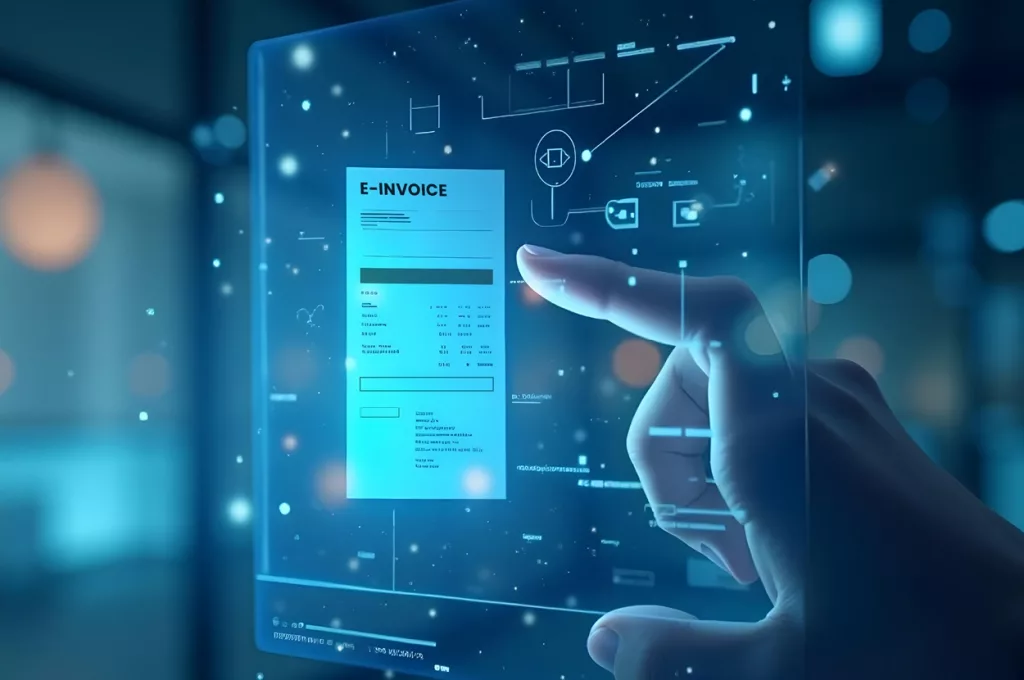Introduction – Why invoice Verification Matters
Every minute, millions of e-invoices are generated in India, which are more than just a payment request. Invoices in current times are proof of trust, and invoice-based funding is a lifeline for thousands of businesses seeking liquidity and working capital for their daily operations.
However, an invoice can result in either growth or loss depending on its genuineness. In recent times, when even the GST department has to make stricter rules around e-invoicing, it is common for fake or duplicate invoices to slip through. Funding a fake invoice is like funding a ghost transaction for BFSI. Implementing an e-invoicing compliance solution helps validate invoice authenticity in real time and minimize fraud risk across lending workflows.
What is Invoice Verification?
Invoice Verification is the process of verifying the genuineness, authenticity, and accuracy of the invoice and transaction data. It verifies
- Whether the goods or services are actually delivered to the buyer,
- GST filing and tax reporting are accurate
- No duplication or fake invoicing involved
- Supplier-buyer relationships are authentic
For BFSI, invoice verification is not just a procedure or step to address before funding; it is about trust, financial security, and risk control. In Invoice-based funding, invoices are used as collateral by the banks and financial institutions. That’s why it is very important to ensure that the invoice is not duplicated, fake, or used for double funding, as any of these would lead to credit funding risk and financial loss.
However, in current times, where the invoice financing sector is booming and businesses are approaching banks and financial institutions for short-term funds, it is equally important to understand the need for technology in invoice verification.
Depending on e-mails, phone calls, manual checks, paperwork, invoice authenticity, and the supplier-buyer’s transaction verification, they cannot keep pace with the scale and speed of digital lending. That’s why it’s important to integrate tech-driven invoice verification.
Type of Invoice verifications
An ideal verification solution can provide two types of invoice verification
1. Consented
In this, lenders can take consent from the borrower to get access to their GST portal and NIC Portal to match the data. Here invoice details are matched with:
- GST returns,
- e-way bill data,
- QR code and IRN
- Transportation details such as FasTags with e-way bill and e-invoice, etc.
2. Non-consented
In this, lenders can check and verify invoice authenticity through QR code scan embedded in the e-invoice without requiring consent from their borrower.
Challenges in Invoice Verification
Even with automation and technology, there are challenges lenders face in invoice verification, which are as follows:
- E-invoicing is not applicable to businesses with less than 5 crores turnover and for B2C transactions, which makes it difficult to verify such transactions.
- For the supply of services, it is difficult to verify if the services are actually delivered or not, and the e-way bill is only applicable in case of movement of goods, making it tough to verify the genuineness of the supply of services.
- With changing e-invoicing regulations, schema updation, reporting requirements, threshold change, etc, keeping the invoice verification module updated is an ongoing process.
- Even with automation tools, human intervention remains high for resolving mismatches or verifying supporting documents, which slows down the decision-making process.
- Gap in timeline of invoice generation and e-invoicing reporting to the portal of 30 days, which is applicable for businesses with a turnover of more than 10 crores, makes it difficult to verify invoices directly from the GST portal.
- In many cases, credit notes are issued at a later date, which is difficult to correlate with their original invoice, where the invoice becomes irrelevant or unreliable as collateral.
- Not all the returns are hard-locked, which can leave room for GST data alteration, creating a mismatch in e-invoice and GST data.
Benefits of Accurate Invoice Verification for Invoice Financing
Accurate and tech-driven invoice verification doesn’t just reduce risk, but it also helps in transforming the entire lending process. Here are a few benefits of accurate invoice verification.
1. Risk Mitigation
An advanced tech-driven invoice verification module ensures the invoice is authentic and accurate to reduce risk, as the invoice is the main collateral in invoice financing.
2. Eliminating Human Oversight
AI-driven invoice verification can identify every small error, mismatches, altered invoice details, duplicate patterns, etc, which can be difficult to catch in human review. It can also cross-check with returns, e-way bill, and vendor history.
3. Faster Processing
Automation and advanced technology like AI/ML help in faster invoice verification, reducing TAT from days to minutes, which helps in faster processing and fund release.
4. Fraud Detection at Source
With fraud analytics, OCR/IDP, and ML, it is possible to identify fabricated invoices, duplication, or fake invoices during the initial process before disbursement, protecting lenders from defaults.
5. Central Repository
An ideal tech-driven invoice verification module provides a centralized repository to prevent double funding of the same invoice and protect from financial loss.
6. Scalable and secure growth
Accurate invoice verification helps lenders to scale their invoice financing services across larger MSME-based sectors and geographies while maintaining data integrity and portfolio health.
7. Enhanced borrower experience
For borrowers, it is important to get access to the funds faster. Therefore, with automation and accurate invoice verification, lenders verify invoices across GST data and the portal in minutes and with less paperwork, which enhances the overall borrower experience.
8. Post-disbursement monitoring
Even after disbursement, lenders can monitor financing status and fund repayments. Any default can be predicted well in advance to take the required action.
Conclusion – Future of invoice verification
India is shifting invoice verification from a simple compliance task to an important part of digital lending. As more MSMEs and supply chains embrace invoice-based financing, lenders cannot depend on manual reviews or incomplete information anymore. The way forward focuses on real-time verification that uses AI, advanced analytics, and detailed GST data.
This shift serves as a base to build faster, more reliable, and scalable credit systems in India. With the changing GST and e-invoicing rules, modern verification methods will go beyond just checking invoices. They will help identify risks, stop fraud, and tailor funding solutions.
To sum up, using precise technology-based invoice verification will drive India’s digital credit confidence forward. Each verified invoice will pave the way for real growth without carrying any hidden risks.








